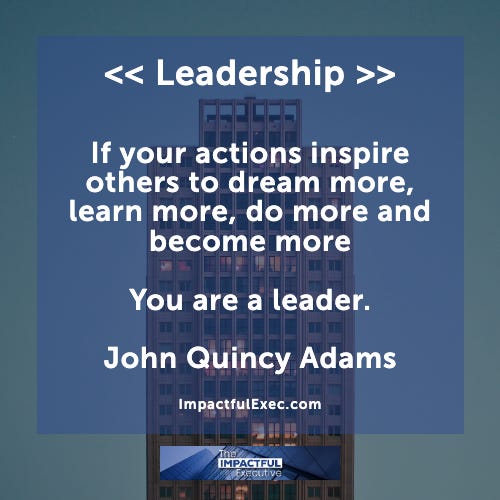Weekly Impact Brief (2023.Dec.24)
Building smarter teams; implementing skills-first talent strategies; giving effective feedback across generations; and faking psychological safety.
Note: We are in private beta. There are rough edges; this Brief will evolve in the coming weeks before we launch more broadly. We value your feedback! To share your input, click here.
Read time: 3 min
Welcome
It’s great to have you here!
This Brief offers leaders quick, fact-driven insights on trending articles released in the last week around leadership, innovation, and more. These are curated from top sources, such as McKinsey, Harvard, and many others, looking at elements of the Impactful Framework.
In case you missed the last Impact Briefs, here are links to the previous two:
Thought Starter
Last week, we covered the element of “Innovation”; this week, we cover “Leadership”.
Highlights
Wharton: How to Make Your Team Smarter
MIT Sloan: A Skills-First Talent Strategy
INSEAD: The Pitfalls of Giving Feedback Across Generations
[Feature] Harvard Business Review: How Leaders Fake Psychological Safety
Impact Pulse
Each week, we review 200+ articles from 50+ premier academic and consulting firm sources to highlight a few “essentials” below.
How to Make Your Team Smarter
Big Idea: To maximize a team's collective intelligence, leaders should choose members for their competencies rather than confidence, use brainwriting instead of brainstorming to generate more creative ideas, and create lattice organizational structures that provide multiple pathways for ideas to surface. Research shows these practices increase idea generation, give all members a voice, and leverage the untapped potential within groups.
Quick Quote(s): "Research reveals that the smartest teams aren’t composed of the smartest individuals. The best teams are aligned around a common goal, evaluated on a collective outcome, organized around a unique role for each member, and motivated to share their knowledge and coach each other regularly."
A Skills-First Talent Strategy
Big Idea: To build a skills-first talent strategy, start by training hiring managers to mitigate bias, source candidates from diverse places like community colleges, and use rubrics and structured interviews; then focus on upskilling employees, creating internal mobility pathways, and measuring business and social impact to retain talent and quantify results. Data shows companies adopting these practices see increases in diversity, retention, quality of hire, and advancement rates for overlooked talent.
Quick Quote(s): "If you require a four-year degree for a role, you're automatically excluding huge chunks of the population… and then you're excluding even larger numbers of people of color. So really thinking about your skills-first practices tied to your diversity strategies is, you know, smart business… We think that education should be in this pure form. Nothing about employability, it should just be about general knowledge. And we need an informed citizenry, and there is an important part to that. But we've been so dismissive of vocational training compared to countries like Germany who really built cultural awareness and investment into things like apprenticeships that it's coming back to hit us."
The Pitfalls of Giving Feedback Across Generations
Big Idea: To bridge generational divides regarding feedback, establish explicit team norms on how and when feedback should be given to create common expectations; this allows all generations, from boomers who expect formal annual reviews to zoomers used to constant informal feedback on social media, to converge on a shared platform that pushes people out of their comfort zones to produce better work. When such norms are followed, multigenerational teams can leverage their diversity of perspectives to expose blindspots and yield superior outcomes.
Quick Quote(s): "If your team is composed of people from various cultures, genders and generations, frequent and open feedback sessions can allow everyone to get stronger ideas on how to improve. It exposes blind spots and promotes greater cohesion. But first, everyone should become more aware of the potential pitfalls so as to nimbly avoid them."
Featured Summary
Below is our featured post for the week: Harvard on faking psychological safety.
How Leaders Fake Psychological Safety
Big Idea: Most leaders want teams to speak up, but research shows only 26% build the skills to enable psychological safety; leaders often "fake" safety by feigning uncertainty, asking for feedback but not using it, or responding to failure with artificial empathy rather than accountable dignity.
Quick Quote(s): "The only way to harmony, comfort, and equilibrium is through the messiness of disagreement, the emotional discomfort that accompanies hard news, and the disequilibrium that arrives when failure must be courageously and compassionately engaged."
To create real psychological safety, leaders must…
Parting Thoughts
Thank you for spending your precious time with us.
We are wrapping up our “beta” phase in the coming weeks, so if you find this Brief useful, please forward it to others that might find it just as valuable.
We wish you a wonderful festive season, and we will be back with further newsletters early next year.
Impactfully yours,
Ali Monadjem (LinkedIn profile)
For The Impactful Executive Team
P.S. If you want to sign up for The Impactful Executive private email list or share it with a friend or colleague, you can find us here.






